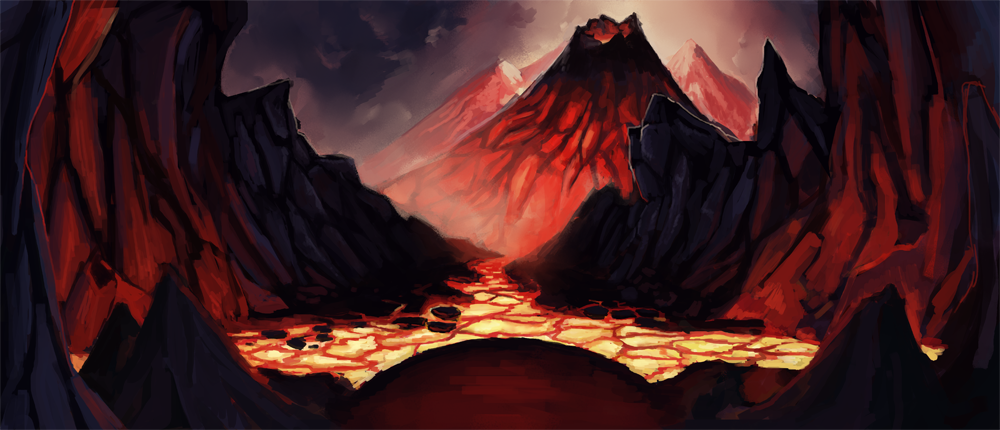Moltor, the Endless Forge
"No one gets a passing grade. I've found that spite is a good motivator."Moltor is the god of the forge, the molten dwarves, and instruction. He is the force responsible for mankind’s ability to pass upon knowledge to students. Though not a god of ambition, he is a god of inspiration, and his works have done much to bring ideas to the most genius of all sapient beings. Moltor is the eldest brother of a family long lost to time. During his age, he was regarded as the greatest architect in existence, a feat that to this day has been unchallenged by any god that has succeeded him. In his prime, gods of his nature formed their own portfolios instead of having them granted by The Progenitor. When Moltor chose his own, he did so with the intent to instruct his followers so well that he would never have to guide them again. Moltor’s traits are shared with his creations, and it is from him that the dwarves of Aohiri have the bushy beards, heavyset bodies, and intimidating demeanor they are known for. Moltor realized that others behaved when they knew of his presence, so he was never the type to have more form than one. Simple was always better in his eyes.- Moltor to Aevinu on architecture.
Moltor's Influence
During his time, Moltor was considered a deity of creation, much like his father. He granted his followers the gift of metalworking and clarity in instruction, and from there his followers would teach themselves. Moltor was mostly uninvolved in the lives of his people. Moltor was blessed with the gift of perfection; only by Moltor’s own hands (or those of Aevinu) would his creations see the wear and tear of time. His followers inherited his stubbornness, seeing Moltor’s perfect architecture as little more than yet another challenge of their expertise. Moltor’s influence was subtle, befitting his silent and strong nature. When he was called upon for guidance, it never failed to take longer to reach him than other gods. When Moltor did speak, however, he spoke with clarity and authority. When he showed a sense of pride—rarely, if ever—the road to his domain would illuminate, and travelers could manually seek him out instead. When enraged, buildings would crumble, lands would burn, and cities would topple.Worshipping Moltor
Statues erected in honor of his name, monuments designed to capture his greatness, societies formed to preserve his legacy—none of these could draw Moltor’s attention. Moltor was infamous for his aversion to religious imagery. He understood it was a natural part of his status as a god, but he preferred that his worshippers remembered him for his craftsmanship and teachings rather than immortalizing him through paintings and scripture. Worship in Moltor’s eyes was less blatant and more subtle—almost wordless, yet understood. Those fortunate enough to find Moltor would kneel before him and present a weapon or piece of armor. With a straying eye, he would both evaluate the item and cast his judgment. “Decent” might as well have been “failure,” as Moltor considered those two words in the same vein. “Pass” was the word Moltor would give when he approved of someone. “Good” was reserved for exceptionally skilled craftsmanship. But never did he say “perfect.” Perfection was something impossible, even if Moltor’s existence defied that belief.Myths of Moltor
Because of Moltor’s reclusive and silent nature, there are many myths surrounding his role among the gods. They vary depending on the society that forms them, yet there are two stories that are constant no matter the variation.The First Builder.
Show spoiler
A Second Orwynd. Moltor’s first disciple, according to one tale, was said to have not been a dwarf as most texts claim. The first to learn under Moltor’s guidance was supposedly one of Moltor’s sisters, Somnosis, who became curious about Moltor’s ability to create anything to last forever. Orwynd, the only city created by Moltor's own hand, served as a reminder to Somnosis of his unmatched architectural prowess. This caused a one-sided rivalry between the two gods, one that Moltor did not care much for. If Moltor did indeed teach Somnosis first, it was likely a mocking gesture, understanding she would always come up short compared to him.
Show spoiler
Moltor loved his worshippers—he always would—but he did not always hold them in high regard. No, when it came to the molten dwarves, Moltor was the harshest teacher they could have. There was a saying often passed around churches dedicated to him: “For others, boredom; for us, disappointment.” In one particular tale, it was said that the Orwynd Moltor created had long been destroyed by his own hands. His people, having realized their immortality, became hedonistic and vain. Worst of all, they brushed off their brother races and deemed them inferior, an act Moltor deemed blasphemous. Still, the Forge God was patient, and as a warning, he simply scorched the only church Orwynd had of him at the time. They could rebuild it if they came to their senses. When this warning went ignored, Moltor fashioned an avatar of himself and ventured to Orwynd, where he made his followers watch him destroy every building they’d ever created. Centuries-old buildings, motley homes—nothing escaped his wrath. His final words upon leaving were: “Do not make me repeat myself.”
Divine Symbols & Sigils
Tenets of Faith
- Perfection is impossible.
- Show patience with all life, even to the hard of hearing.
- Never fall prey to sloth.
- Build with only what is necessary, and build it well.
- Speak from experience, and never shy from failure.
- Guide the lost; extend a hand to the stubborn.
- You are one of millions. Do not act special.

Divine Classification
Greater Deity (Old Universe)
Lesser Deity (New Universe)
Lesser Deity (New Universe)
Alignment
Lawful Good
Honorary & Occupational Titles
The Silent Father
The Endless Forge
The Endless Forge
Circumstances of Death
Erased (Formerly)
Children
Forge; Knowledge; Order




Nice quote, but goodness does his teachings sound tough! I like how you have laid out the article, there's some interesting information here. After reading your article I wonder how does a god become erased? Great article!